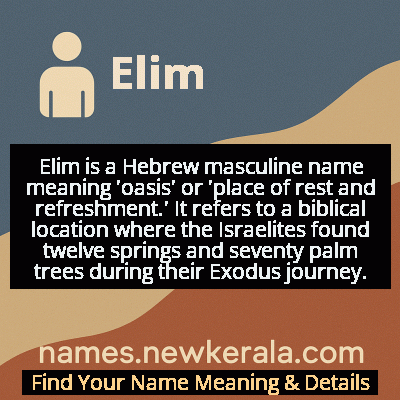Elim Name Meaning & Details
Origin, Popularity, Numerology Analysis & Name Meaning of Elim
Discover the origin, meaning, and cultural significance of the name ELIM. Delve into its historical roots and explore the lasting impact it has had on communities and traditions.
Name
Elim
Gender
Male
Origin
Hebrew
Lucky Number
3
Meaning of the Name - Elim
Elim is a Hebrew masculine name meaning 'oasis' or 'place of rest and refreshment.' It refers to a biblical location where the Israelites found twelve springs and seventy palm trees during their Exodus journey.
Elim - Complete Numerology Analysis
Your Numerology Number
Based on Pythagorean Numerology System
Ruling Planet
Jupiter
Positive Nature
Optimistic, inspirational, and creative.
Negative Traits
Scattered, exaggerating.
Lucky Colours
Yellow, gold, purple.
Lucky Days
Thursday.
Lucky Stones
Yellow sapphire.
Harmony Numbers
1, 2, 9.
Best Suited Professions
Arts, writing, communication.
What People Like About You
Creativity, optimism.
Famous People Named Elim
Elim
Biblical figure
One of the stations during the Israelites' Exodus journey where they found 12 springs and 70 palm trees
Elim Chu
Contemporary musician
Korean-American composer and music producer known for film scores and contemporary classical works
Elim Albright
Religious leader
Prominent Methodist minister and missionary in early American frontier settlements
Name Variations & International Equivalents
Click on blue names to explore their detailed meanings. Gray names with will be available soon.
Cultural & Historical Significance
Throughout Jewish and Christian history, Elim has been interpreted symbolically as a place of spiritual refreshment and God's faithfulness. The name has been used in various religious communities, particularly among Puritans and other Protestant groups who valued biblical place names. In modern times, it continues to carry this rich heritage while also being appreciated for its simple, strong sound and meaningful background. The numerical symbolism of twelve springs (representing the twelve tribes) and seventy palm trees (often associated with completeness) adds deeper layers of meaning to the name's cultural significance.
Extended Personality Analysis
Individuals named Elim are often perceived as calm, refreshing presences in social situations, much like the oasis their name represents. They tend to be natural peacemakers who provide emotional support and stability to those around them. Typically thoughtful and introspective, Elims are known for their ability to create safe spaces where others can find rest and renewal. Their personality often combines practical wisdom with deep empathy, making them excellent listeners and trusted advisors.
While generally reserved, they possess inner strength and resilience that emerges during challenging times. Many Elims demonstrate a strong connection to nature and spirituality, valuing authenticity and meaningful relationships over superficial connections. They often excel in roles that require patience, nurturing, and the ability to see the bigger picture. Their calm demeanor and reliable nature make them sought-after friends and colleagues, though they may need to guard against taking on too much emotional responsibility for others.
Modern Usage & Popularity
In contemporary times, Elim remains a relatively uncommon but meaningful choice for boys, particularly among families with Judeo-Christian backgrounds or those seeking biblical names with positive connotations. The name has maintained steady but low usage in English-speaking countries, often chosen by parents who appreciate its peaceful meaning and historical significance. While not appearing in the top 1000 names in most countries, it has seen a slight resurgence in recent years as part of the trend toward unique biblical names. It's particularly popular in religious communities and among parents seeking names that are both traditional and distinctive. The name's simplicity and positive associations make it appealing to modern parents looking for meaningful yet uncommon names that won't be shared by multiple children in the same classroom.
Symbolic & Spiritual Meanings
Symbolically, Elim represents refreshment, renewal, and divine provision in times of difficulty. As an oasis in the desert, it embodies the concept of finding sustenance and rest amid challenging circumstances. The twelve springs and seventy palm trees mentioned in the biblical account symbolize abundance, community, and God's perfect provision. Metaphorically, the name suggests someone who brings comfort and restoration to others, acting as a source of emotional or spiritual refreshment. It also carries connotations of hope, resilience, and the idea that even in barren situations, there are places of beauty and sustenance. The numerical symbolism (twelve representing tribal completeness and seventy suggesting divine perfection) adds layers of meaning about wholeness and spiritual fulfillment that resonate across various cultural and religious contexts.

